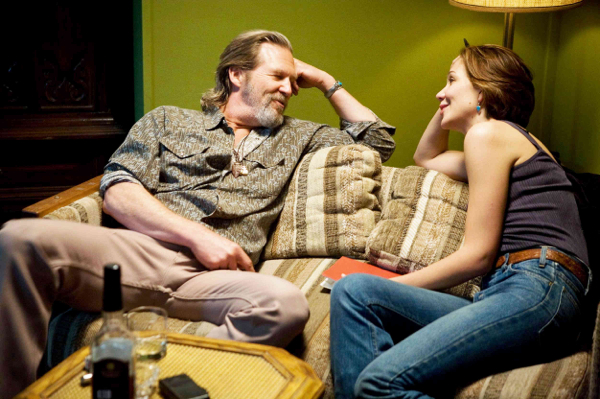Movie review by Greg Carlson
The steadfast Jeff Bridges appears in nearly every frame of “Crazy Heart,” carrying the movie on his sturdy shoulders and infusing it with just enough depth, charm, and dignity to transcend the familiarity of its oft-told story. First time feature director Scott Cooper also wrote the screenplay adapted from Thomas Cobb’s 1987 novel, and Cooper gives Bridges all the space the actor needs to work his formidable magic. In the hands of a less gifted performer, a figure as messy and wrecked as alcoholic singer-songwriter Bad Blake could swiftly sour into a puddle of bathos, but Bridges knows exactly how much line to reel out, protecting Mr. Blake with an armor of tart intelligence and self-perception underneath the booze-soaked shame and regret.
Following a brutally funny piece of exposition that explains the distance of Blake’s fall from grace, Cooper reveals one of Blake’s sorest indignities: his once bright career has been eclipsed by the protégée he formerly mentored. Surviving on a diet of whiskey and cigarettes, the 57-year-old soldiers on, steering his battered two-tone Suburban to small time gigs with even smaller pay. The cheap motels and one night stands that await Bad after last call have evidently fueled the musician’s subject matter, even though the man has not written any new material in a few years. While Bad putters around from bowling alleys to dive bars throughout the American Southwest, he maintains just enough contact with his agent to convey his endless resignation and bitterness.
During a stop in Santa Fe, Bad agrees to be interviewed by writer Jean Craddock (Maggie Gyllenhaal), and despite the sizable gap in age, their initial flirtation turns into something more serious. “Crazy Heart” moves with an easygoing pace that masks some of the director’s desires to explore tougher, sterner complications brought on by Bad’s disease, and the tentative relationship that develops between Bad and Jean functions as the means by which Bad will eventually hit bottom. Against her better judgment, Jean lets Bad develop a bond with her four-year-old son, but an easily foreseeable near-disaster precipitated by Bad’s excessive drinking threatens to foil one of the last good things in the musician’s life.
Cooper is a more assured handler of character than plot, and the short scenes in which Colin Farrell appears as rising star Tommy Sweet, Blake’s former student and current rival, are among the film’s best. One expects Tommy to respond negatively to Bad’s barely concealed antagonism and hostility, but the younger man treats Bad with courtesy and respect. Bridges and Farrell also do their own singing, and are convincing interpreters of the perfectly crafted tunes by T Bone Burnett, Ryan Bingham, and the late Stephen Bruton.
Robert Duvall’s appearance in “Crazy Heart” immediately calls to mind “Tender Mercies,” and the veteran performer, who is also listed as one of the film’s producers, provides unaccompanied vocals on a section of Billy Joe Shaver’s “Live Forever.” In addition to “Tender Mercies,” “Crazy Heart” invites comparison to “The Wrestler,” particularly in the way that both films examine the strained dreams of once popular performing artists who have abused their bodies and neglected or abandoned their own children. Both Bad Blake and Randy Robinson seek comfort in the arms of younger single mothers, as well as second, third, or fourth chances in their personal and professional lives. In both films, we are reminded that the deepest beauty is often in the singer, not the song.
